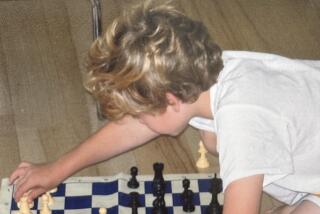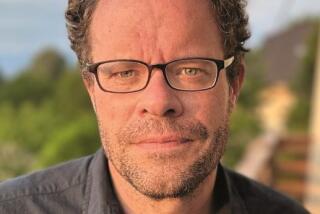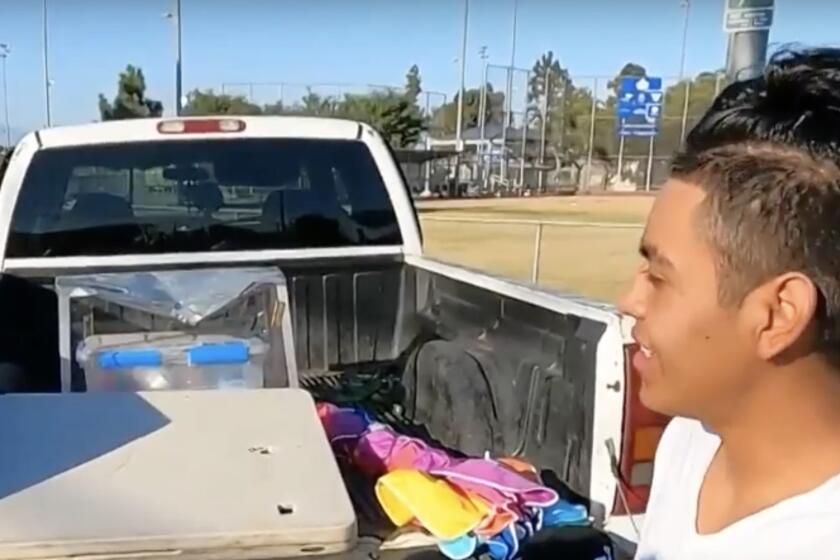Chess takes root in Central Valley farm town, blossoms into a state title for Latino boys high school team
Reporting from Mendota, Calif. -- The Knucklehead Code of Honor always included honesty and kindness. Humility is a recent addition.
“We never had to worry about gloating before because we never won before,” said Vaness French, coach of the Knuckleheads, otherwise known as the Mendota High School chess team.
The nickname refers not to human blockheadedness, but to the cylinders on vintage Harley-Davidson motorcycle engines known for their durability.
Drought-weary Mendota — a Central Valley town of stilled machinery and packinghouses surrounded by industrial agriculture — is the kind of place that requires durability just to survive. Out here, even sunlight seems hard.
Each week, at least a third of the town’s families receive a bag of fruit and vegetables — and, if it’s a good day, a chicken — provided by churches and food banks. In this city of 10,000, unemployment hovers around 45%.
So when a group of high school boys, each with his own world of worries and yearning and coached by a man in ill health, brought a state championship home, the reaction was joyous astonishment.
Councilman Joseph Riofrio owns a small market on the main street and knows how many chess team members count out pennies to buy a snack. At a City Hall ceremony honoring the team, he could barely keep his voice from breaking.
“In Mendota, we’re known for the wrong things: not having water, being such a poor community. We’re surrounded by abundance — we’re the cantaloupe capital of the world. But still, it’s dust, it’s dirt, it’s hard out here. And for the Mendota chess team to be the best in the state after playing affluent communities — kids with private chess tutors — it’s unfathomable,” he said.
The 12-member team has been toasted by the Fresno County Board of Supervisors and invited to throw out the first pitch at a minor league baseball game. On Monday, the students traveled to Sacramento, where they were honored on the Assembly floor for placing first in the Premier Division at the CalChess State Championships. For many of them, it was the farthest they had ever traveled from Mendota.
::
French, 45, is a black man who doesn’t speak Spanish. When the 100% Latino team acts up, he yells in French. He thinks it’s a good way to get their attention.
He is, by his own estimation, a middling-at-best chess player. The last time he was around tournament chess before coming to Mendota, he was in junior high.
He wasn’t at a high point in his life when he arrived 10 years ago. He was so broke a friend had to pay for gas for him to drive 40 miles from Fresno to volunteer in a class taught by chess master Artak Akopian, then Fresno’s highest-ranked player.
Within a year, Akopian left for Los Angeles, and the school district asked French to take his place. He took the position on condition that the chess club would become a team and compete against other schools.
He had an ally: 67-year-old Ernie Lozano, a retired shop steward at the now-closed Spreckels Sugar plant, who had taught eight nieces and nephews to play chess. Lozano was soon “Tio” (uncle) to everyone on the team.
French, who had spent most of his working life as a bookkeeper and manager at his uncle’s Fresno golf course, had never been a teacher, coach or mentor.
“But this sad-joyful thing happened: I stopped being selfish. I was willing to sacrifice to give them the time and attention they needed,” he said. “I never married or had kids. I think of them as my own kids, and they have responded.”
It never occurred to him the team could place first at the state tournament. But looking back, he thinks he should have seen it coming. Something had been building, week by week, in the small trailer on the elementary school grounds where the chess club meets Fridays after school.
Without many chess books or easy access to computers, team members turned to each other — rehashing games, comparing strategies, playing endlessly. They even showed up Mondays during the elementary school chess class to help French teach the younger children.
Kevin Romero, 15, went from perennial loser to checkmating opponents in three moves. His was one of the four high scores that nabbed the state prize for Mendota.
A big, St. Bernard puppy of a boy, he has been suspended from the team for the rest of the school year for “behavior unbecoming a Knucklehead.” French left it up to the entire 40-member team — first-graders through high school — to decide whether Kevin had broken their code of honor and to determine punishment.
“I don’t teach chess, exactly,” French said. “I teach character.”
Kevin considers his sentence just.
“I was — how shall we say this — a tad, a mite, a teeny bit over-exuberant,” he said. “I was sort of a 10-plus on the boasting scale.”
Jessi Mendez, 17, had a different problem. He was feeling “very confused by life — lost, to put it bluntly” during this, his senior year. He’d been questioning his faith, his ambitions, whether he could really find a way to go to college. The chess team made him feel part of something.
“It’s like we’re the start. There’s the little kids behind us. We have to show what kids from places like Mendota can do if they only get an opportunity.”
::
Most of the members of the high school team have been with French since they were in third grade.
Chrispen Reyes, 16, is the new guy. He is also the most focused. After a loss, he rolls out his vinyl chess board on his bedroom floor and replays the game move-for-move.
When he was placed in foster care a year ago, his one request was to live in Mendota, a few miles from the farming community where he grew up.
“I’d seen their team at chess tournaments, and I wanted to play for Mr. French,” he said. “I want to be a chess champion. I want to be known.”
On the night in early April when the team bus returned from the state tournament in Santa Clara, the players tumbled out the doors screaming and tossing around trophies. Lozano hugged everyone in sight. Chrispen stood off to the side.
“Chrispen doesn’t let many people in,” Lozano said. “He’s hurt. You can just see that. But there’s also something about him where you go, ‘Man, there’s a really good kid.’”
Chrispen didn’t tell his foster mother, Gloria Marquez, about the championship. The first she heard of it was when his social worker called and said Chrispen had been lying about being on the chess team. After all, he didn’t appear in a team photo that ran in the local newspaper. He’d been at a track meet that day, it turned out.
Marquez sat down with Chrispen.
“M’ijo, this is a big, big thing,” she said. “You should have told me.”
She wanted to celebrate, but Chrispen said no.
Marquez thinks she understands. When he was placed in foster care, he and his five younger half siblings were separated. Chrispen hopes to reunite them someday.
“He doesn’t want to enjoy things until he can share them with his family,” Marquez said.
French chooses the team’s captains, based not on ability but on what they need to learn. He chose current captain Milton Arroyo because he focused too much on himself. Now, French considers the high school senior his right-hand man, aware of the needs of the whole team.
Next year’s captain is Chrispen.
“Chrispen has to learn that he needs other people,” French said, “and they need him.”
::
On tournament days, Lozano and his wife, Gloria, a migrant-education teacher who has taught most every child in town over the years, get up at 6 a.m. to make tortillas, fry chorizo and potatoes, and wrap them into burritos. They arrive with breakfast as team members emerge from their first games.
“We know they don’t have money for food,” Lozano said. “And we’re there for them when they lose to say: ‘Did you do your best? Did you put your heart into it? Then we’re proud of you.’”
They used to be the team’s only boosters. “But now the whole city is excited. And it’s not just Mendota, it’s all these farm towns,” Lozano said.
In the bigger chess world, Mendota’s championship is nothing striking. But for people who live in the world of packing houses and field labor, the town’s success in a game of intellect and imagination has resonated.
“We teach our kids, ‘Never give up on playing the game.’ Put the pieces back on the board and look for the opportunity you didn’t see before,” Lozano said. “These kids remind people what can happen when you don’t know how to quit.”
::
On a recent Friday, French and the high school team are back in their trailer. There’s a demo board on the wall, and French is playing against the class. They shout out their moves in unison until Chrispen leaps from his seat to make a move. He puts French’s king in check and forces French to take the team’s bishop — a move that will set him up for defeat.
“Eat it. Eat it,” the class chants.
“Make thy move,” Chrispen tells French.
“Guys, you have beat the old man,” French admits, laughing.
When French arrived in Mendota, he weighed 360 pounds and doctors were debating whether he needed a heart transplant. Many days he came to class with a walking stick and an oxygen mask.
As he grew closer to the students, he decided he wanted to have energy to keep up with them. He had gastric bypass surgery, lost 156 pounds and now works out regularly. Without the extra weight, French’s enlarged heart doesn’t have to work as hard, though it remains fragile.
He missed the first day of the state tournament. He was in the emergency room with an infection.
Milton texted updates. When French learned that Luis Castillo, an “A” student with a near-novice chess ranking, had beaten a much-higher-rated player, French whooped so loud that nurses came running.
“That doesn’t happen. None of this happens,” said French, who now runs chess programs at four schools in Fresno and hires himself out as a chess tutor. “I guess I forgot to tell my kids what was impossible.”
In Mendota, only 1 in 10 people has a high school diploma. In nine years, only two of French’s chess team members have dropped out of school.
“I swear I won’t lose another,” he said. “None of this is really about chess. It’s about giving them futures.”
Ernie Lozano hopes those futures unfold far from Mendota. He was born here. He likes the way the sun hits the fields. He likes the church bells and taco trucks and how fiercely proud everyone is of their children.
“But there’s nothing here for our kids. The sugar plant closed, the garlic plant closed, the jail hasn’t opened.”
There’s only the fields, and the Lozanos say Mendota has sent too many to back-breaking work that can’t feed a family.
“They’ll still have Mendota,” Gloria Lozano said. “They’ll carry us and the town and all we tried to teach them in their hearts. They’re kids.
“They think they need the world, but really, the world needs them.”
Marcum is a Times special correspondent.
More to Read
Sign up for Essential California
The most important California stories and recommendations in your inbox every morning.
You may occasionally receive promotional content from the Los Angeles Times.











